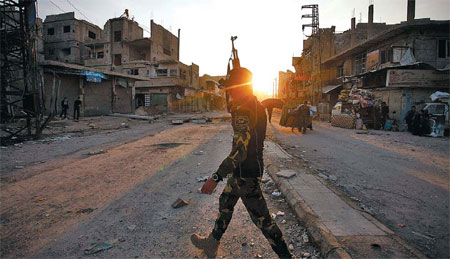2nd Syria meeting marks positive 'step'
Agreement on a date for a second Geneva conference on the Syrian crisis marks a step toward a political solution for the war-torn country following the dismantling of its chemical weapons, analysts said.
But they warned that, as Syria has become a hotbed of terrorism and extremism, more terrorism cases might disturb the peace process, which deserves concerted efforts from major powers.
Beijing said on Tuesday it welcomes the move, saying the most urgent task is to build a dialogue platform for every side in the Syrian crisis, and China will continue to provide humanitarian aid to Syria.
UN Secretary-General Ban Ki-moon announced on Monday that the long-awaited peace talks between the Syrian government and the opposition would be held on Jan 22.
It will be the first direct talks between the Syrian government and the rebels.
The goal is to agree on a mutually acceptable transitional administration as well as other elements of an outline peace plan drafted by the West and Russia in Geneva in June 2012, according to Ban.
The civil conflict has killed more than 10,000 people and displaced nearly 6 million, according to the UN.
The first round of Geneva talks ended with a communique laying out key steps toward ending the violence.
A second such conference has been delayed for months due to sharp differences between the government and the opposition, and different stances among the opposition groups also.
The decision came a day after Syria's regional ally Iran cut a deal on its nuclear program with the US and other world powers to ease fears of a wider war in the Middle East.
Li Guofu, director of the Center for Middle East Studies at the China Institute of International Studies, said the decision on restarting the negotiations sends a positive signal for a final solution to the crisis.
Yet Li said the peace process still faces a lot of uncertainties, as a major obstacle is that the opposition groups, divided in their goals and regions, have difficulties in uniting and selecting representatives to the talks.
While some major opposition groups have signaled their willingness to participate, others have refused.
A rebel group, the Free Syrian Army, announced on Tuesday it would not attend the second Geneva meeting, stressing it will keep fighting.
Experts said peace talks could also contribute to curbing terrorism in Syria, and all Syrian opposition groups should unite against terror threats in the country, as the conflict is helping fuel terrorism and sectarian tensions in neighboring countries, especially Iraq.
Nickolay Mladenov, UN envoy to Iraq, said resolving the Syrian crisis and adopting a regional strategy against all forms of extremism "are vital to bringing stability to Iraq".
A political solution can eliminate the root cause of the rampant terrorist activities in both Syria and neighboring countries, Li said.
Wu Sike, China's special envoy to the Middle East, said terrorist groups are definitely unwilling to support the meeting. They will try to spoil the talks in different ways.
Meanwhile, the milestone progress made by world powers and Iran on the Iran nuclear issue recently will provide a positive influence for the solution of the Syrian crisis, he added.
Iranian Foreign Minister Mohammad Javad Zarif said on Tuesday Iran was prepared to take part in the Syria peace talks in Geneva, if invited.
Contact the writers at mojingxi@chinadaily.com.cn and wujiao@chinadaily.com.cn
|
An Iraqi Shiite fighter from a group called the Hussein Brigade patrols the town of Hejeira as civilians carry their belongings from homes destroyed during clashes between the Sunni-dominated Free Syrian Army and Syrian government soldiers. Syrian troops captured Hejeira, in the rural suburbs of Damascus, on Nov 21. Jaber Al-Helo / Associated Press |
(China Daily 11/27/2013 page10)













